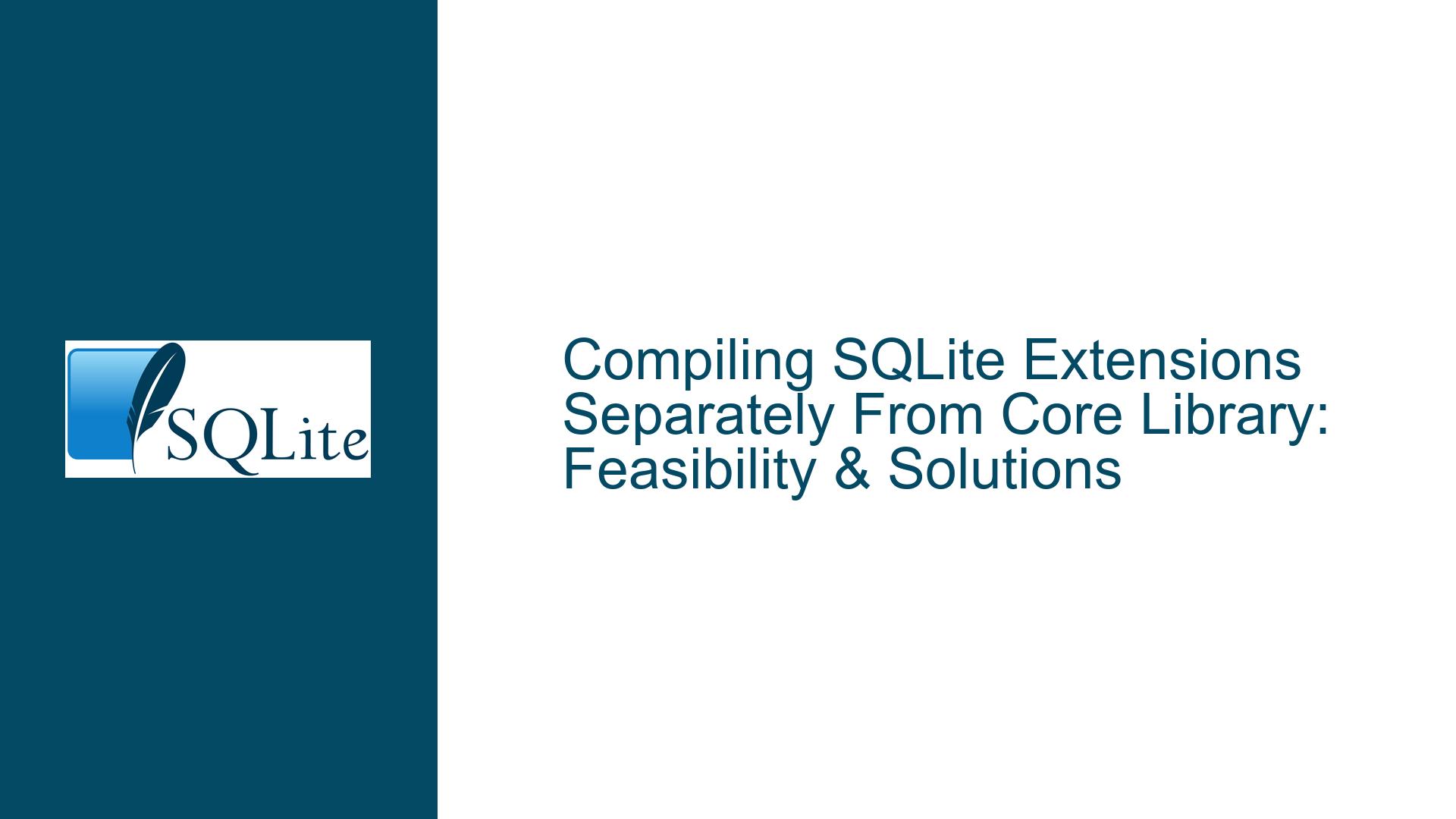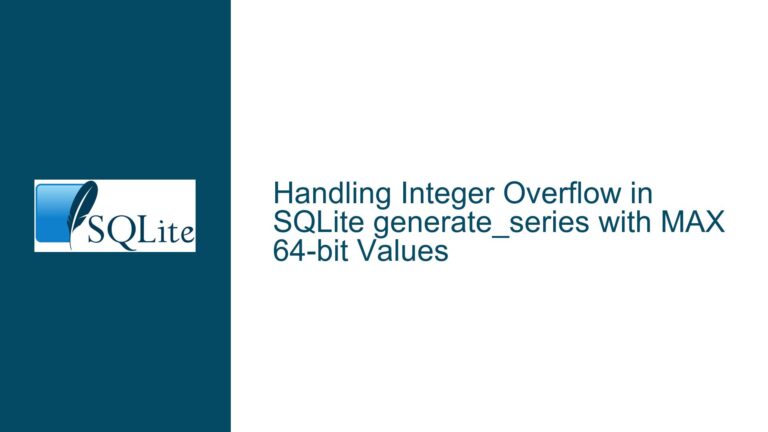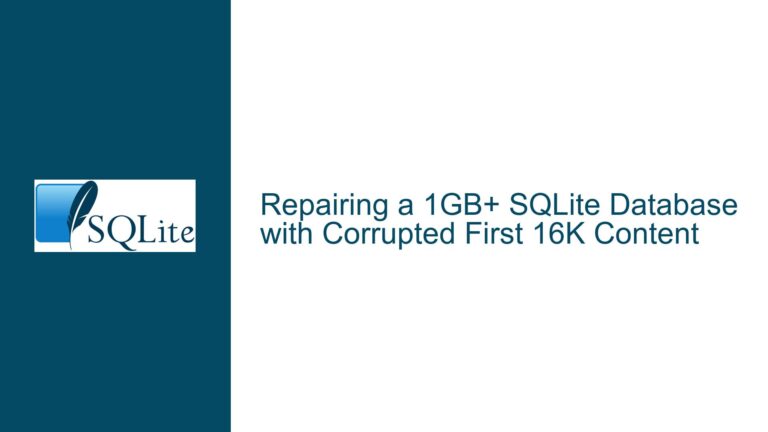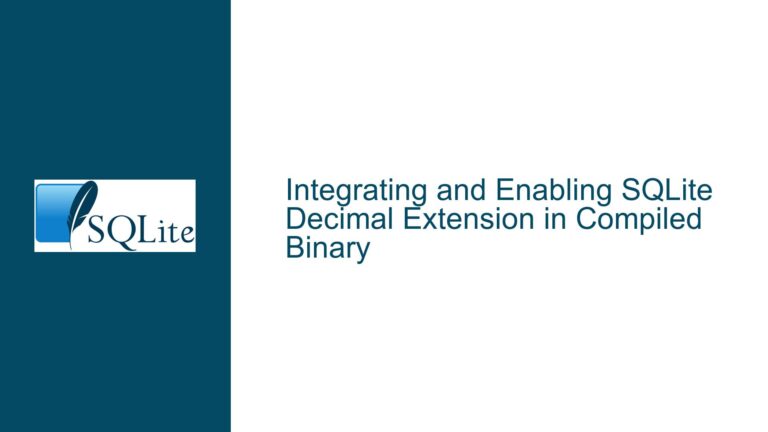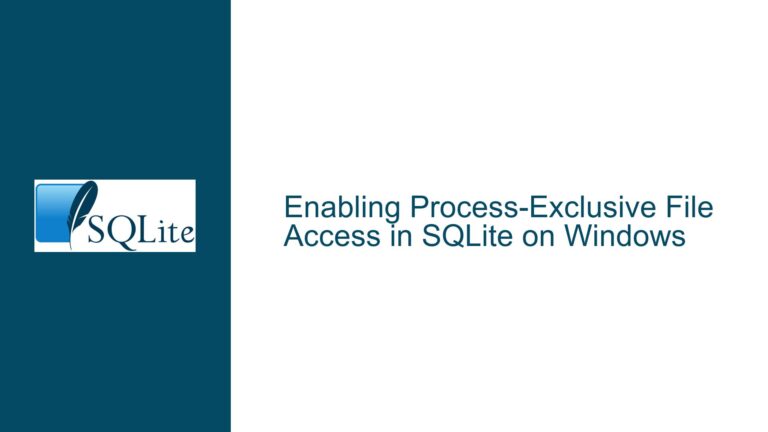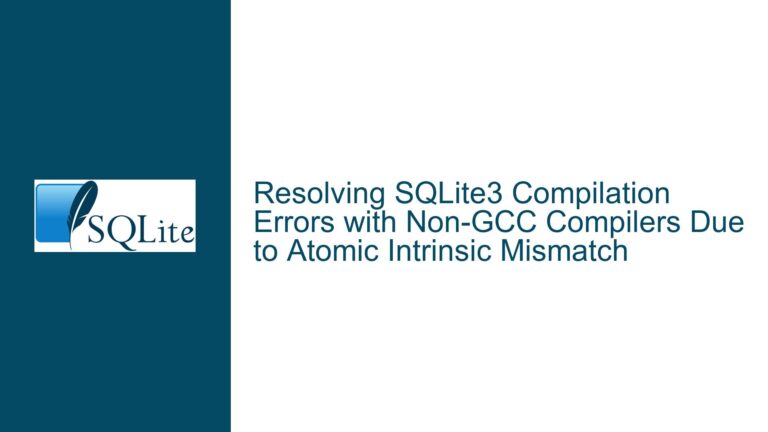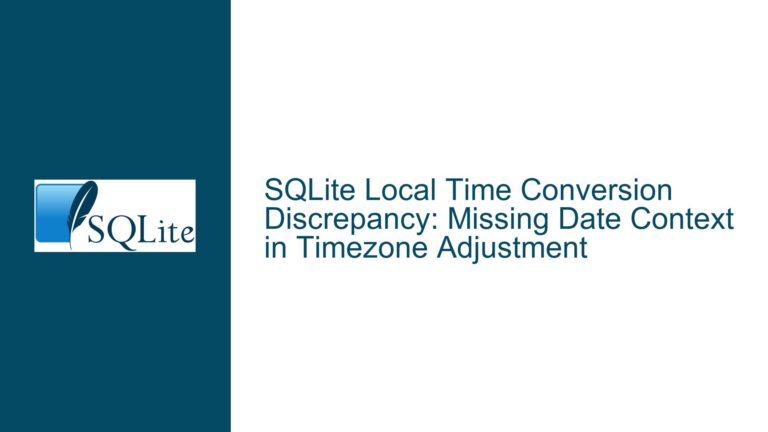Compiling SQLite Extensions Separately From Core Library: Feasibility & Solutions
Understanding the Amalgamation Build Process and Extension Integration
The SQLite amalgamation is a single C code file (sqlite3.c) and header (sqlite3.h) that combines the entire core library and its built-in extensions into a unified codebase. This design simplifies integration into projects by eliminating external dependencies. However, this monolithic structure raises questions about isolating specific extensions—such as FTS5 (Full-Text Search) or JSON1—for compilation independent of the core library. The challenge arises when developers want to reuse an existing SQLite instance (e.g., one provided by an operating system or third-party application) while adding extensions as modular components.
Extensions like FTS5 and JSON1 are tightly coupled with SQLite’s internal architecture. They rely on non-public APIs, data structures, and version-specific features. For example, FTS5 uses virtual table interfaces and tokenizers that interact directly with SQLite’s query planner and storage engine. The amalgamation does not separate these components into discrete compilation units. Attempting to extract an extension’s code from sqlite3.c would require surgical precision to retain dependencies while excluding unrelated subsystems like the B-Tree module or WAL (Write-Ahead Logging) implementation. Even if successful, the extracted code would still reference internal symbols (e.g., sqlite3_api routines) that assume linkage to a complete SQLite runtime.
A common misconception is that preprocessor directives (e.g., -DSQLITE_ENABLE_FTS5) can filter out the core library during compilation. In reality, these flags enable or disable features at compile time but do not modularize the amalgamation. Disabling the core library would render extensions non-functional, as they depend on SQLite’s memory management, error handling, and type system. The amalgamation’s design intentionally avoids modular compilation to ensure deterministic behavior across platforms. This tight integration guarantees that all components adhere to the same versioning and configuration options, critical for maintaining SQLite’s renowned stability.
Key Obstacles to Isolating Extensions
1. Amalgamation Monolithic Structure:
The amalgamation is not a collection of loosely coupled modules but a unified codebase where extensions share global state with the core library. For instance, the FTS5 extension registers callback functions (e.g., xCreate, xConnect) that are invoked by SQLite’s virtual table machinery. These callbacks access internal data structures like sqlite3_vtab and sqlite3_index_info, which are defined in the core library. Compiling FTS5 separately would require exporting these structures and their supporting functions—a task complicated by their lack of public API guarantees. Furthermore, the amalgamation uses static functions and inline macros extensively, making symbol extraction impractical without source modification.
2. Version Compatibility Risks:
Extensions compiled against one SQLite version may fail or exhibit undefined behavior when loaded into another version. SQLite maintains backward compatibility for its public API but does not extend this guarantee to internal interfaces used by extensions. For example, if an extension uses a core library function that is later refactored or removed, loading the extension into a newer SQLite build could cause segmentation faults or memory corruption. The SQLite team tests extensions only within the context of their original amalgamation, leaving cross-version compatibility untested and unsupported.
3. Compilation Flag Conflicts:
SQLite’s behavior is highly configurable through compile-time options (e.g., -DSQLITE_THREADSAFE=0). If the core library and extension are compiled with mismatched flags, subtle bugs can arise. Consider a scenario where the core is built without threading support (SQLITE_THREADSAFE=0), but the extension assumes thread-safe APIs like sqlite3_mutex_enter(). This mismatch could lead to race conditions or deadlocks. Extensions distributed as precompiled binaries compound this risk, as their compilation environment is often unknown to downstream developers.
4. Extension Initialization Dependencies:
Extensions initialize via the sqlite3_auto_extension() mechanism or explicit sqlite3_load_extension() calls. Both methods assume the core library is fully initialized and its jump table (a structure of function pointers) is populated. Attempting to load an extension before the core library initializes—or after it has been shut down—results in undefined behavior. This dependency is hard-coded; extensions cannot "lazy-load" their dependencies or negotiate runtime feature detection.
Strategies for Modular Extension Deployment
1. Leverage Standalone Extension Source Files
The SQLite source tree includes standalone C files for many extensions (e.g., ext/misc/json1.c, ext/fts5/fts5.c). These files are designed for compilation outside the amalgamation, provided they link against a compatible SQLite core library. To build FTS5 as a loadable module:
# Compile the core library (if not already present)
gcc -c sqlite3.c -o sqlite3.o -DSQLITE_CORE
# Compile FTS5 extension, linking against core symbols
gcc -c fts5.c -o fts5.o -DSQLITE_CORE
gcc -shared -o libfts5.so fts5.o sqlite3.o
The -DSQLITE_CORE flag is critical: it instructs the extension to expect external linkage to SQLite’s core functions rather than embedding them. However, this approach assumes access to both the extension’s source code and a compatible core library build. Version mismatches must be rigorously avoided—e.g., building FTS5 from SQLite 3.40.0 against a core library from 3.30.0 might fail if internal APIs have changed.
2. Use Dynamic Loading With Version Checks
When loading extensions via sqlite3_load_extension(), include runtime version validation:
sqlite3 *db;
sqlite3_open(":memory:", &db);
// Check core library version before loading extension
if (sqlite3_libversion_number() < 3040000) {
fprintf(stderr, "SQLite 3.40.0+ required for FTS5 features\n");
exit(1);
}
// Load extension with entry point 'sqlite3_fts5_init'
sqlite3_load_extension(db, "./libfts5.so", "sqlite3_fts5_init", NULL);
Extensions should also validate versions internally. Modify the extension’s initialization function:
int sqlite3_fts5_init(
sqlite3 *db,
char **pzErrMsg,
const sqlite3_api_routines *pApi
) {
SQLITE_EXTENSION_INIT2(pApi);
if (sqlite3_libversion_number() < SQLITE_VERSION_NUMBER) {
*pzErrMsg = sqlite3_mprintf(
"Extension requires SQLite %d or newer",
SQLITE_VERSION_NUMBER
);
return SQLITE_ERROR;
}
// ... rest of initialization ...
}
This guards against loading the extension into an older core library but does not address forward compatibility (newer core, older extension).
3. Preprocess Amalgamation with Source Analysis Tools
Tools like COAN (C预处理器分析工具) can conditionally include/exclude code blocks based on preprocessor directives. While not foolproof, this allows extraction of extension-related code from the amalgamation:
# Example: Extract FTS5-related code from sqlite3.c
coan source -DSQLITE_ENABLE_FTS5 -USQLITE_OMIT_FTS5 sqlite3.c > fts5_partial.c
The resulting fts5_partial.c will contain FTS5 code and its dependencies. However, this is error-prone due to:
- Undefined behavior from removed code paths (e.g., omitted error handling routines).
- Unresolved symbol references to core library functions.
- Macro expansions that assume the entire amalgamation is present.
This method requires iterative testing and manual patching to resolve compilation errors. It is not recommended for production use but serves as a last resort for research or debugging.
4. Static Linking with Wrapper Libraries
Create a wrapper library that exports only the extension’s symbols while statically linking the core library:
# Compile amalgamation with FTS5 enabled
gcc -c sqlite3.c -o sqlite3.o -DSQLITE_ENABLE_FTS5
# Extract FTS5 symbols (hypothetical example)
objcopy --localize-hidden sqlite3.o \
--keep-global-symbol=sqlite3_fts5_init \
--keep-global-symbol=sqlite3_extension_init \
fts5_wrapper.o
# Create shared library
gcc -shared -o libfts5_wrapper.so fts5_wrapper.o
This hides all core library symbols except the extension’s entry points. However, symbol localization tools like objcopy are platform-dependent and may not work reliably across compilers. Additionally, the resulting binary still contains the entire core library, negating the goal of modular distribution.
5. Cross-Version Compatibility Shims
For extensions requiring backward compatibility, implement a shim layer that maps legacy APIs to their modern equivalents. Suppose an extension relies on sqlite3_strnicmp(), which was renamed from sqlite3_strncasecmp() in SQLite 3.30.0. The shim would check the core version at runtime and alias the function accordingly:
#if SQLITE_VERSION_NUMBER < 3030000
#define sqlite3_strnicmp sqlite3_strncasecmp
#endif
This requires meticulous analysis of API changes across versions and increases maintenance overhead. The SQLite team does not endorse this approach, as internal APIs are subject to change without notice.
Conclusion
Compiling SQLite extensions independently of the core library is technically feasible but fraught with challenges. The safest approach is to use standalone extension source files compiled against a known-compatible core library version, coupled with rigorous runtime checks. Preprocessing tools and static linking wrappers offer alternatives at the cost of increased complexity and maintenance. Developers must weigh these trade-offs against their specific deployment requirements, prioritizing stability and long-term maintainability.
